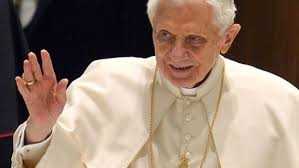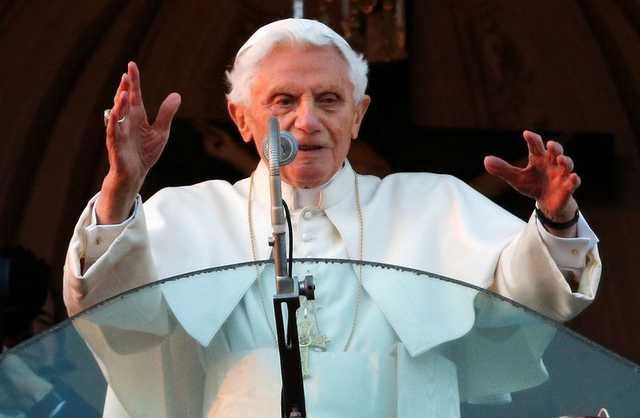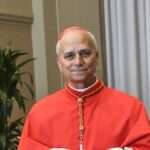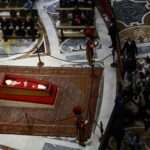
Former Pope Emeritus Benedict XVI, who stood down as leader of the Catholic Church in 2013, has sadly died at his residence within the Vatican Gardens, aged 95.
His health had been in decline for some time and had spent his final years at the Mater Ecclesiae Monastery, with him receiving frequent visits from his successor Pope Francis.
In a short statement issued by the Vatican, his passing was confirmed as occurring today (December 31) at 09:34 (08:34 GMT), after an aggravation in his condition due to his advancing years, and they announced that his body will be placed in St Peter’s Basilica from 2 January for “the greeting of the faithful”.
A single bell was heard ringing from St Peter’s Square in Rome immediately after his death, which is where Pope Francis will lead the funeral on 5 January.
Crowds gather in St Peter’s Square
Following the news people began gathering in the square to pray and remember him, many stating a feeling of bewilderment at the unprecedented and historic situation and a sense of uncertainty, with no protocols to follow. There is a possibility that there will be a state funeral with foreign leaders invited, as Benedict was previously the head of state of the Vatican City.
Uncertainty over proceedings
When he resigned he became the first Pope in 600 years to step down from the role, and the first to do so voluntarily since Celestine V in 1294; meaning that this will be the first time where a living pope will help bury a former pope. Normally a “camerlengo” has a vital role of officially confirming the death, traditionally by tapping the head three times with a small silver hammer and calling out his name.
He would also oversee the destruction of the pope’s fisherman’s ring, sealing the papal apartments, organising the funeral and preparing a conclave to elect a successor. Obviously on this occasion none of that will be required.
Family buried in Germany
Additionally, in normal circumstances each pope can specify their own funeral arrangements, and it is understood that Benedict indicated that his preference was to be buried in the tomb that belonged to his predecessor John Paul II, before he was canonised and moved elsewhere in the Vatican.
That is despite the fact that his family is buried in Germany.
One of oldest pope’s ever elected
Joseph Aloysius Ratzinger was born into a deeply Catholic family on 16 April 1927, in the southern German state of Bavaria. He was 78 when in April 2005 he became one of the oldest popes ever elected, following John Paul’s death, and after presiding over his funeral Mass and delivering the homily, based around Christ’s words “follow me”.
Health issues take their toll
However, his health was not good and had been worsening prior to his election, and the additional burdens of papal office took their toll, although it was only later revealed that he had been fitted with a heart pacemaker during that same year.
Papacy lasted less than eight years
For much of his papacy, the Catholic Church faced allegations, legal claims and official reports into decades of child abuse by priests. Then on 11 February 2013, he summoned his Cardinals to inform them that that he would be leaving office because of his deteriorating health.
The announcement was made without any warning and delivered in Latin.
Tributes
Italy’s Prime Minister Giorgia Meloni said: “He put his life at the service of the universal Church and spoke to the hearts and minds of men with the spiritual, cultural and intellectual depth of his Magisterium.”
The head of the Catholic Church in England and Wales, Cardinal Vincent Nichols, said in a statement: “I remember with particular affection the remarkable Papal Visit to these lands in 2010. We saw his courtesy, his gentleness, the perceptiveness of his mind and the openness of his welcome to everybody that he met.”
British Prime Minister Rishi Sunak called the former pope “a great theologian whose UK visit in 2010 was an historic moment for both Catholics and non-Catholics throughout our country”.
Archbishop of Canterbury, Justin Welby, said Pope Benedict was “one of the greatest theologians of his age, who was committed to the faith of the Church and stalwart in its defence.”
Father Benedict a highly intellectual pope
He was an accomplished pianist, with a taste for Mozart and Brahms. He also spoke eight languages. He chose to retain his papal name, rather than revert to being Joseph Ratzinger, but preferred to be known simply as Father Benedict.






0 Comments